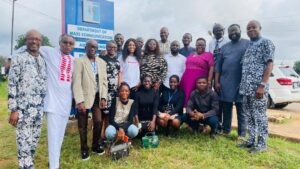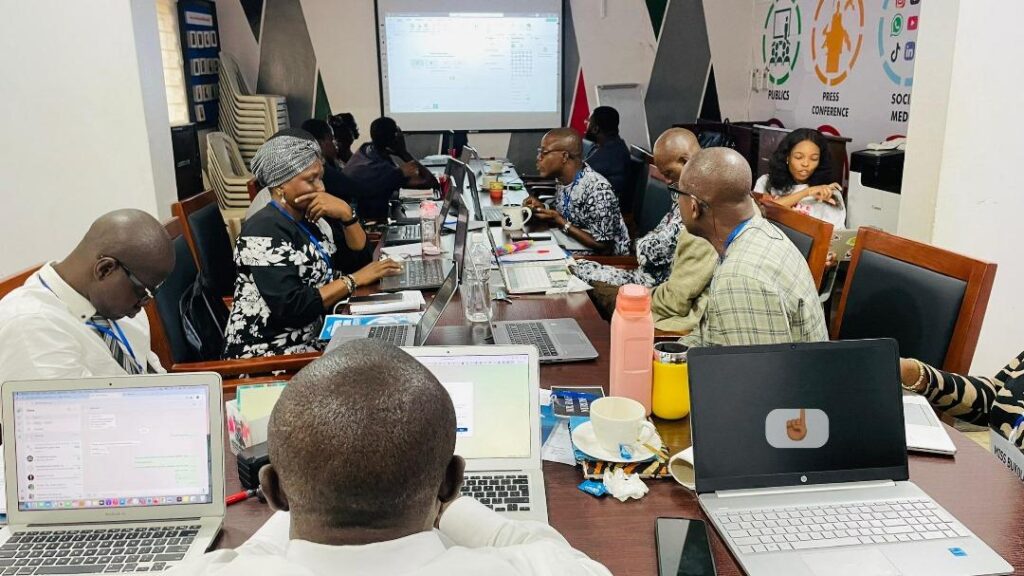Mass Communication students must be prepared for the jobs of tomorrow in a rapidly changing media industry influenced by AI and data journalism.
The Head of the Department of Mass Communication at Lagos State University of Science and Technology (LASUSTECH), Dr Steve ‘Anu Adesemoye, stated this during a two-day AI and Data Journalism workshop, in collaboration with Dataphyte.
” “We must prepare our students for tomorrow’s journalism by preparing the educators. Journalism is evolving, and we need to embrace AI and data to remain relevant in the profession. Our goal is to see collaborations that benefit our students and position our department for future opportunities,” he said.
Adesemoye who was represented by the immediate past Head of Department, Dr Prosper Zannu, expressed the department’s plan to reposition itself as a leader in data-driven, technology-enhanced journalism education.
He thanked Dataphyte for its contribution and commitment to enhancing journalism education in Nigeria.
The training, which commenced on Monday, September 23, 2024, held at the Public Relations and Advertising (PRAD) Laboratory within the department.
The workshop was designed to equip both students and staff with the tools necessary to produce data-driven stories and leverage AI in journalism. It also provided educators with the opportunity to enhance their expertise and better impart this knowledge to students.
The workshop was led by facilitators from Dataphyte, including Mr Adam Bifola Raji, Mrs Tina Rural Okonkwo, and Mr Nurudeen Hassan, a lecturer in the department. Mr. Bifola Raji, Director of Dataphyte Academy, highlighted the importance of data in journalism, stating that “Journalism is built on insight, and insight is built on data.” He emphasized that data journalism allows for well-informed and data-driven storytelling.
In his session, Mr Hassan introduced participants to various tools used for secondary data collection and demonstrated how effective software can enhance data gathering and analysis in journalism. He stressed the importance of utilizing these tools to tell impactful and data-driven stories.
Mrs. Okonkwo guided attendees on analyzing, visualizing, and cleaning data using specialized software like Power BI. She provided detailed steps on how to effectively use data for storytelling, highlighting how data journalism allows journalists to produce accurate and fact-based stories.
In an interview with one of the facilitators, Mr Adam Bifola Raji, he expressed his delight in being part of the training and emphasized the importance of capacity building in journalism.

“It’s essential to build capacity in AI and data journalism. The journalism space is rapidly evolving, and data is now central to storytelling. Journalists must learn how to analyze and utilize data effectively to create impactful stories. My advice to aspiring journalists is to embrace innovation and be data-driven in their reporting. The challenge, however, is the availability of reliable data. Without data, storytelling becomes difficult, but once that hurdle is crossed, the sky is the limit.”
Mrs. Tina Okonkwo also shared her thoughts on the workshop. When asked about her experience facilitating the session, she stated:
“It was really exciting to discuss data journalism, particularly using tools like Power BI to analyze journalistic data. Data journalism is crucial because it moves away from guesswork and relies on hard facts. Journalists can now tell stories based on what the data reveals, which ensures that the public gets accurate and impactful stories.”
On her career’s biggest highlight, she remarked:
“For me, the biggest moment in my career was landing my first role as a data analyst. Transitioning from one field to another is challenging, but succeeding in that role gave me the confidence to continue pushing boundaries.”
Mr. Ade Inasa-Thomas, a lecturer in the department, commented on the significance of the workshop:
“This training is vital for the faculty as well. It helps us upgrade our skills and ensures we are aligned with contemporary practices in journalism. The tools introduced here, especially in data gathering and analysis, are transforming how we practice journalism. It’s important that we, as educators, pass this knowledge on to our students to ensure they are well-prepared for the changing media landscape.”
Queen Aladegbola, a 300-level Mass Communication (Journalism Unit) student, expressed her enthusiasm:
“I’m really happy that our department organized this event. I’ve always been interested in AI and data journalism, and the training exceeded my expectations. It’s exciting to be learning these skills, and I believe they’ll be instrumental in my future career.”
President and Editor-in-Chief of the Union of Campus Journalists at LASUSTECH, Ibrahim Habeeb Irewole, delivered the vote of thanks. He expressed the students’ gratitude, saying:
“On behalf of all students, I would like to express our heartfelt appreciation to our lecturers for providing us with this invaluable opportunity. Thank you for organizing this training and for your dedication to our growth.
“We, the students, are grateful and committed to making the most of this experience. We promise to utilize the knowledge and skills gained to achieve excellence. Thank you, sir.”
Department members present included Dr Steve Adesemoye, Dr Prosper Zannu, Dr Taiwo Okeowo, Mr Samuel Ogunsanya, Mr Gbenga Akanmu, Mrs Olayinka Idowu, Mrs Bukola Lasisi, and Mr. Ibrahim Fatoyinbo.
Students who participated in the program included 300-level students Ibrahim Habeeb Irewole, Ajide Muminat Omosholape, Aladegbola Queen Adeorite, and 200-level students Shakiru Samuel Oluwagbafunmi, Oshuniran Sheriff Ola, Odunlami Deborah Feyisara, and Kashimawo Blessing Ibukunoluwa.


